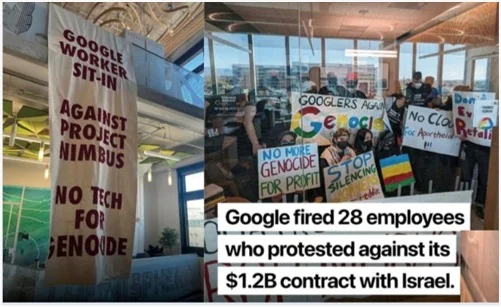17 Apr. 24
Recent protests have erupted among Google workers and pro-Palestinian demonstrators in California and New York, demanding the cancellation of a $1.2 billion contract known as Project Nimbus between tech giants Google and Amazon and the Israeli government, Al Jazeera reported on Thursday. The demonstrations were sparked by revelations about the controversial cloud computing and artificial intelligence (AI) agreement, which reportedly involves providing technology services to the Israeli Ministry of Defense.
The protests, which resulted in the arrest of nine Google employees during sit-ins at company offices, highlight growing discontent within these tech firms over their collaboration with Israel. Project Nimbus, finalized in 2021, has drawn criticism from employees concerned about potential human rights violations against Palestinians.
According to details emerging from TIME’s report, the contract allows the Israeli Ministry of Defense to access Google Cloud services for data storage, processing, and AI capabilities. The agreement also involves Google providing consulting services to expand the ministry’s cloud access, allowing for the deployment of automation technologies across multiple units.
A leaked draft contract, dated March 27, 2024, indicates that Google billed the Israeli Ministry of Defense over $1 million for consulting services and offered a 15% discount through the “Nimbus framework”. Google’s role involves assisting with architecture design, implementation guidance, and automation for the ministry’s cloud landing zone.
Despite Google’s assertions that its involvement is primarily for civilian purposes such as finance, healthcare, transportation, and education, protestors argue that this collaboration indirectly supports Israeli military operations, including the expansion of settlements on Palestinian land.
In response to concerns raised by employees and activists, a joint statement signed by 90 Google and 300 Amazon workers in 2021 condemned the contract, citing fears that the technology provided could be used to surveil Palestinians and facilitate illegal settlements.
Google, however, maintains that its work with the Israeli government is focused on non-military sectors and emphasizes that the Nimbus contract does not involve sensitive or classified military activities.
The protests underscore broader debates within the tech industry about corporate responsibility and ethical considerations in the context of global conflicts and human rights issues. The pushback from employees reflects a growing trend of tech workers advocating for more ethical guidelines governing company engagements with governments and militaries worldwide.
Critics, including employees from the No Tech for Apartheid group, have voiced concerns about the project since 2021, arguing that it could bolster Israel’s surveillance of Palestinians and contribute to displacement and discrimination. The protest gained urgency following the outbreak of the Israel-Gaza war in October. However, Google has terminated the employment of 28 employees following a prolonged sit-in protest at its Sunnyvale and New York offices.


